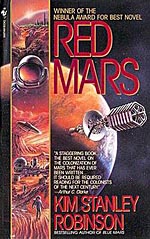
![]() Tar Daddoo
Tar Daddoo
4/17/2013
![]()
What is the Science Fiction Premise?
Red Mars depicts the colonization of Mars by humans. It is the first of a series of novels that also includes Green Mars and Blue Mars.
Is the science of the premise explored?
One of the interesting things about a premise like the colonization of Mars is that a great many sciences are involved. Fortunately, the author, Kim Stanley Robinson, is up to the challenge. We are greeted with descriptions of the physics, chemistry, biology, geology (areology for Mars), engineering, and more as humans struggle to implant themselves on Mars. Frankly, in this regard the book is a Tour de Force.
Red Mars is a book of Hard SF. The author is trying to paint a credible story about how martian colonization might occur. The Science starts with straightforward descriptions based on existing knowledge and departs into reasonable extrapolations as it progresses. By the end, there might be a few things you look back on as fantastic, but there are not many and even these have snuck up on you.
Is the impact of the premise on an individual explored?
Quite plausibly, Red Mars assumes that the initial colonization of Mars will involve a team of one hundred colonists specially chosen for the mission who are departing on a one way journey. Composed of eight sections, each of which follows the thoughts and actions of a single character, we obtain an intimate look at six of the characters (two are assigned two sections) and a second hand view of many more. This technique allows the author to reveal how some adapt to Mars, some try to bring Earth to Mars, and some are well suited to either realm.
Is the impact of the premise on society explored?
Ultimately, on top of the science and the detailed descriptions of people's lives is the challenge of determining what form Martian society should take. I do not want to say too much about this because it is central to the mystery underlying Red Mars. Suffice it to say that there is tension regarding whether Mars is being colonized to serve Earth or to serve the colonists.
How well written is the story?
I found Red Mars easy to read and I look forward to reading the sequel. It is a bit long and had a substantial focus on science, engineering, and the geography (areography) of Mars. Nevertheless, I found that the early sections of the book sustained my attention. It was only in the last couple of sections that I became impatient with the pacing, which is a bit surprising, since that is when the action picked up.
One area in which I commend the author is in his descriptions from the perspectives of the different characters. Often an author is unable to credibly portray more than one personality type. Here we are greeted with six distinct types of people and their thoughts, actions, and interactions all fit into coherent profiles. These six characters are not only revealing Mars to us from different vantage points, but through entirely different lenses.
Can I recommend the book?
If you are at all interested in the colonization of Mars or a realistic portrayal of how humans might move out beyond Earth, then you should read Red Mars. I cannot think of a book that is as thorough or credible on this topic.
If you are a student of Science Fiction, then I highly recommend Red Mars as an example of Hard SF. The book is exemplary on all fronts: the science, the personal tales, the societal impact, and the quality of writing.
If your interest in Science Fiction is primarily as a source of adventure stories, you might find Red Mars somewhat disappointing. There is adventure, but it takes a long time to develop and unfold. There is action, but it does not arrive until well into a long book. And, there is conflict, but it is often cerebral in character.
But, don't let me talk you out of it. If you care at all about the science in Science Fiction, then you should give Red Mars a chance. I think you will be pleasantly surprised.
Tar Daddoo